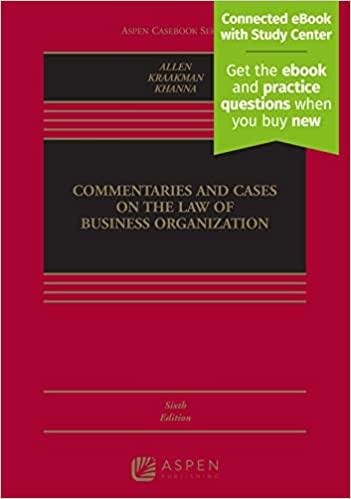Question
RESPOND TO YOUR CLASSMATES POST! PLEASE PROVIDE 3 REFERENCES! ORIGINAL QUESTION: Using the links in this Unit,find a Federal or State Statute that is relevant
RESPOND TO YOUR CLASSMATES POST! PLEASE PROVIDE 3 REFERENCES!
ORIGINAL QUESTION:
Using the links in this Unit,find a Federal or State Statute that is relevant to your life, career, job, etc. and explain its relevancy.Tell us your opinion about the public policy behind the law. What public policy is served by this law? In other words, what problem does it address?
In response to your peers, discuss how the statute they chose is relevant to you or if it isn't relevant, explain why.Find ways to expand the discussion to any other area that we read about the legislative process in Chapter 3. For example, what is the function of lobbyists? What is meant by session law? What are the steps of the legislative process? What do Walston & DeLeo mean when they write about judicial review of legislation? Feel free to refer back to any part of chapter 3 in your reply posts.
CLASSMATES POST:
I chose a state statute, the state that I reside in, which is Alabama. Alabama Code Title 34. Professions and Businesses 34-7B-1. In 2007 I received my Cosmetology license, and before graduating with my certificate I already had two salons calling my teacher wanting me to come work for them. I had no idea that anyone knew that I was pursuing my Cosmetology license, but word travels fast. It made me proud to know that there were salon owners inquiring about me before I even graduated.
I wanted to give the guideline for becoming a Cosmetologist. I attended one year of school at Alabama Southern Community College in Thomasville, Alabama. We had one hour of lecture in the morning, then the rest of the day was all hands-on. There were three different sections/rows, and that was referred to as the beginners, then the intermediate, then advanced. The public could come in at anytime, and get any service at a discounted price, because we were students. At the end of that year, I had to go to Mobile, Alabama and take a written test. Upon passing the written test, I then went to Montgomery, Alabama to take my practical with the Alabama Board of Cosmetology. A letter was sent by mail letting you know your results.
A cosmetologist by law has to work in a salon for at least one year under a master cosmetologist before they can open their own salon, and this is for good reason. No one just completing school, having no experience or clientele should attempt to do this, so this rule is for good reason, and very practical. I worked at Expose almost five years, and it was the best experience ever. The owner and my mentor taught me everything she knows, I quickly built my clientele, and loved every minute I was there.
In 2007 I opened Studio136. I became a master cosmetologist, and when the Board of Cosmetology's representative made her pop in visits, I never scored anything below 100. I was so proud of the fact that I was open for ten years and scored a 100 every time she came. Alabama Board of Cosmetology has agents that go around to every salon and make sure by a particular guideline that everything is the way it should be. Cleanliness, clean barbicide, handicap accessible, etc. Board could come in at anytime on anyday, so it was best to have your salon the way it should be from the beginning.
A primary purpose of the U.S. democratic system of government is to provide laws that will protect society from what is unsafe for, or unacceptable to, the majority of citizens. Generally, statutes serve to protect citizens as a whole from unnecessary physical, social, and financial dangers. From the very start, specific laws were established to protect the people from unnecessary governmental influence or intrusion into their private lives. The Bill of Rights ensures that people have the right to live freely and to comment and produce change when laws are established or enforced unfairly.
The protection of fundamental rights as put forth in the amendments to the Constitution is not the only way in which legislation protects the public. Many other laws serve another type of protective purpose. Any statute that sets out the type of conduct required of individuals protects the public from improper conduct by others. Protective laws are designed to set forth what people are entitled to expect as citizens of this country. Protective laws do exactly what their name implies: They protect what are considered to be the rights of the people to have a safe and reasonable environment in which to live and work.
REFERENCE:
Walston-Dunham, B. & DeLeo Jr., J.D. (2020). Introductioin to law (7th Ed.). Boston, MA.: Cengage Learning, Inc.
FindLaw.com - Alabama Code Title 34. Professions and Businesses 34-7B-1 - last updated January 01, 2019 | https://codes.findlaw.com/al/title-34-professions-and-businesses/al-code-sect-34-7b-1.html
Step by Step Solution
There are 3 Steps involved in it
Step: 1

Get Instant Access to Expert-Tailored Solutions
See step-by-step solutions with expert insights and AI powered tools for academic success
Step: 2

Step: 3

Ace Your Homework with AI
Get the answers you need in no time with our AI-driven, step-by-step assistance
Get Started


